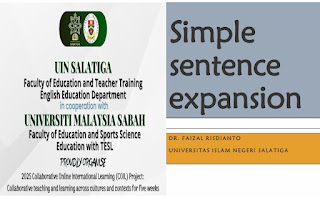*20 possible ELT research topics on REGISTER
JOURNAL*
REGISTER JOURNAL, 1979-8903
(PRINT) – 2503-040X (ONLINE) is an OPEN ACCESS, ESCI WoS, SINTA 2 Indexed
double-blind, peer-reviewed Journal of English for Islamic educational
institutions and Muslim communities. Aim and Scope: REGISTER JOURNAL, the
Journal of English for Islamic Educational Institutions and Muslim Communities,
aims to provide a dedicated platform for disseminating research, best
practices, and innovative approaches related to teaching and learning English
within Islamic educational contexts. The Journal focuses on enhancing the
quality of English education in Islamic schools, colleges, universities, and
other educational institutions while also considering Muslim learners' unique
cultural, religious, and linguistic needs.
Based on the updated Focus and
Scope of the Register Journal (Journal of English for Islamic Educational
Institutions and Muslim Communities), here are 20 possible linguistics research
topics:
Here are 20 potential
manuscript titles suitable for submission to the REGISTER JOURNAL,
aligned with its focus on English education in Islamic educational institutions
and Muslim communities:
Curriculum
Development
- Designing an Integrated English
Curriculum for Islamic Boarding Schools: Balancing Language Skills and
Religious Values
- Curriculum Innovation for English
Learning in Madrasahs: A Framework for Faith-Based Education
Teaching
Methodologies
- Task-Based Language Teaching in Islamic
Contexts: Challenges and Adaptations
- Blending Islamic Teachings with
Communicative Language Teaching in EFL Classrooms
- The Role of Project-Based Learning in
Enhancing English Proficiency among Muslim Learners
Language
Acquisition
- Second Language Acquisition Among Young
Muslim Learners: A Socio-Cultural Perspective
- Influence of Qur’anic Arabic on English
Vocabulary Acquisition in Bilingual Madrasah Students
Assessment
and Evaluation
- Developing Faith-Sensitive English
Assessment Tools for Islamic Schools
- Evaluating Speaking Skills in Islamic
Junior High Schools: An Alternative Assessment Approach
Materials
Development
- Designing English Learning Materials with
Islamic Content for Primary School Students
- Culturally Relevant English Textbooks:
Integrating Islamic Themes into EFL Materials
Cultural
and Religious Considerations
- Navigating Cultural Sensitivity in
English Language Instruction for Muslim Learners
- Islamic Values in English Classrooms:
Teacher Perceptions and Practices in Islamic Higher Education
Educational
Policy and Administration
- Policy Analysis of English Language
Education in Indonesian Islamic Schools
- Implementing Bilingual Education Policy
in Pesantren: Impacts and Insights
Innovative
Practices and Case Studies
- Using Islamic Storytelling in English
Classes: A Case Study from a Rural Madrasah
- Mobile-Assisted Language Learning in
Pesantren: Opportunities and Limitations
Community
and Muslim Parental Involvement
- Muslim Parental Involvement in English
Education: A Case Study from Urban Madrasahs
- Engaging Parents in English Language
Learning: A Collaborative Model for Islamic Schools
Interdisciplinary
or Broader Perspectives
- Bridging Language and Faith: A Critical
Review of English Education in Muslim Communities Worldwide


